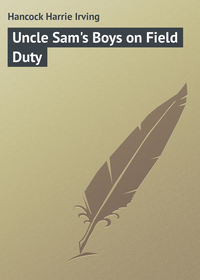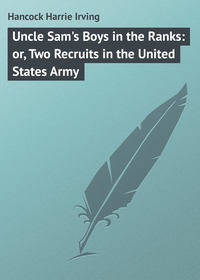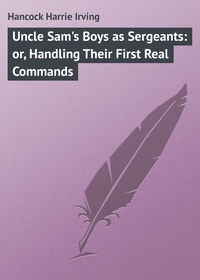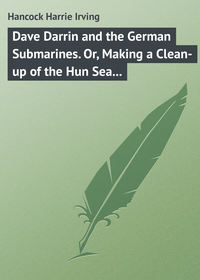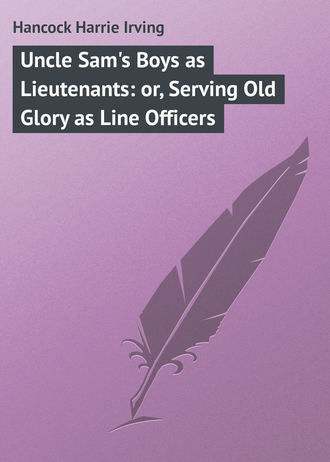
Uncle Sam's Boys as Lieutenants: or, Serving Old Glory as Line Officers
"It would please the Hepburns and Sayles better if we did now," laughed Hal. "But let's forget malice toward others – we've been able to get everything on earth that we've wanted so far. Noll, to-morrow morning, we must pay another visit to Sergeant Wright."
Several times since their return home the Army boys had been to call on Wright, a retired old Army sergeant living in this Jersey town. It was Sergeant Wright who had first inspired the boys with a desire for the Army life.
"We've got several visits to make, and very little time in which to do it," decided Noll.
It is difficult, indeed, to keep the press from learning all that is happening. The next morning the Sphere contained this paragraph:
"Most of our citizens will be glad to learn that Lieutenants Overton and Terry, of the Regular Army, are leaving soon to go to their new station in far-away Texas."
There was nothing libelous in that paragraph. It could be taken either way – as a piece of congratulation or as a covert sneer. So Hal and Noll concluded to let it pass as a joke, and each clipped out the paragraph to show at Fort Butler.
All the good home times ended at last. Divided between pangs of regret and eager thoughts of the new service as line officers, Hal and Noll boarded a train one morning and started west.
The new life, the goal of their youthful dreams, lay before them. What would it bring?
CHAPTER VII
AN OLD FRIEND IN A NEW GUISE
AT eleven o'clock on the morning of September fifteenth two slim, sun-burnt, erect and athletic-looking young men walked into headquarters at Fort Butler.
The sergeant seated at a desk in the outer room, after taking a look at them, concluded to take a chance. He rose, saluted and stood at attention.
"What can I do for you, gentlemen?" he asked.
"Is Major Tipton at headquarters?" queried Hal.
"Yes, sir."
"Will you take our cards in to the major if he is not too busily engaged to receive them?"
The sergeant glanced at the uppermost card, on which was printed, from engraved script, in the regular form for officers' cards:
"Henry Overton,U. S. Army.""At once, gentlemen," replied the sergeant. "Will you be seated!"
The sergeant vanished behind the door to the next room. In an instant he came out again, halting just beyond the doorway, and announced:
"Major Tipton wishes you to step inside, gentlemen."
Major Tipton was standing by his desk to receive his new young officers. He was a large man, tall, with broad shoulders and somewhat inclined to portliness. His hair was iron-gray, his face rather highly colored. But he looked the picture both of courtesy and heartiness as he held out a hand to Hal.
"Welcome, gentlemen," was his greeting. "Welcome to the Thirty-seventh. I can speak, with especial heartiness, for the second battalion."
Hal and Noll presented themselves by name.
"Be seated, gentlemen. And so you have come up from the ranks? We have many splendid officers in the service who took the same path to commissions. I had the hard-won pleasure of coming through West Point, but many of the officers who have served with me and under me came up from the ranks. Our battalion now has its full complement of officers. The two second lieutenants of the other companies are men just from West Point this year."
"I think you will like the post here, especially if you are fond of the water. As you will find, when you have time to take a walk, this reservation is right on the bank of the Rio Grande River. In fact, this post is a frontier station. But that you have already gathered from maps or other sources."
"We have looked up everything we could find about Fort Butler, sir," Noll answered.
"You are both bachelors, I understand."
"Yes, sir," assented Hal.
"Good. We have plenty of room in the bachelor quarters, and no more cottages, at present, for married officers. So, gentlemen" – here the major's eyes twinkled merrily – "you will be doing me an especial favor if you do not contemplate marriage for the present."
"We are wholly free from engagements in that line, sir," Noll laughed.
"I am glad to hear it, Mr. Terry. A young officer should first find out if he can live on his pay, before he tries to make it do for two persons. Having been informed that you were bachelor officers I have already given orders that your quarters be made ready. We have twelve sets of officer's quarters here, and, including yourselves, only five officers to put in the quarters. And now I take it that you will want to go to your quarters after your long ride on the train!"
"We are wholly at your orders, sir," responded Hal.
"Then I will take time to play host in what is really Uncle Sam's house. I will take you over to your quarters myself. Pardon me for a few moments, while I do some telephoning."
Calling up the quarters of Captain Goodale, Major Tipton said:
"Captain, this is the commanding officer. Your new second lieutenant, Mr. Terry, is here. He will call upon you at two o'clock this afternoon, unless you have another engagement for that time. Two is all right, is it? Thank you, Captain."
Major Tipton then called up Captain Foster, informing him that Mr. Overton would call upon him at two o'clock that afternoon.
"Now, where is your baggage, gentlemen? At the station, I suppose."
"Yes, sir."
"I will send for one of the battalion quartermaster sergeant's men to take your checks and have your baggage up here without delay."
A private soon entered, received the baggage checks of the young officers and departed.
"Now, come along, gentlemen," invited the major, reaching for his uniform cap. "I will take you over to your quarters at once."
Fort Butler looked like many another army post, in that the reservation was several hundred acres in extent; that it had well-laid, well-kept roads, a guard house, parade ground, hospital, administrative buildings, a barracks for enlisted men and other quarters for the officers. The post lay in a flat country bordering the river, and the grounds about the buildings were tastefully laid out.
From the little headquarters building Major Tipton led Hal and Noll in a somewhat southerly direction toward the officers' quarters. At the extreme western end of "officers' town" lay a plain, barracks-like building, with front porch upstairs and down.
"That barn will be your home, gentlemen," announced the major. "And the building just this side is the one that contains the officers' club."
"Officers' club," otherwise known as "officers' mess," is a term that might be misunderstood by a civilian. The "club" is where the bachelor officers eat their meals; other officers on post often eat there, too, especially in the absence of their families. There are reading and writing rooms at the "club," and other features that make it a somewhat pleasant lounging place for young officers in their few leisure hours. While there is plenty of comfort at an officers' club there are few in which anything like real luxury is to be found. And, while the civilian may remain at his club until well into the small hours the Army officer, with his next day of arduous duty ahead of him, usually leaves his club between nine and ten in the evening, if not much earlier.
Major Tipton then led the young officers to the bachelor house, explaining that he had assigned them quarters upstairs, as they would find them much pleasanter than the downstairs rooms.
The two sets of quarters proved to be facing each other, Hal's on the east side, Noll's on the west side. Each set consisted of a parlor and bedroom, with bath and dressing-room adjoining.
"There's room enough here, sir, to start married life in," smiled Lieutenant Overton.
"Have you that bee buzzing about you?" asked the major, giving him a keen glance.
"Not in the least, sir."
"I have arranged for two excellent men to act as your strikers," continued the commanding officer. "Their selection is, of course, subject to your approval. At Fort Butler an officer pays a striker eight dollars a month."
The two lieutenants expressed their thanks. While they were still inspecting their quarters two private soldiers came up with the baggage from the railway station.
"I'll take my leave, now, and give you time to dress," said the major, rising. "I shall be at the club during the noon-time to-day, and will introduce you to such of the officers as may be present."
Both young officers saluted as their commander withdrew.
"Now we've got to hustle," admonished Hal. "We'll have a lot to do."
"I'm busy," affirmed Noll, rising and making for the door to go to his own quarters.
Hardly had the door closed when a knock came. Another knock could be heard at Noll's door.
"Come in," called Hal, and a young private entered, saluting.
"Major Tipton arranged with me to serve as your striker, sir, until you make some other arrangement," reported the soldier.
"You've come at just the right moment, then," answered Hal. "Your name?"
"Ellis, sir."
"Very good, Ellis. Unpack my trunk and bags in the bedroom. I'm going into my bath."
"Very good, sir."
Catching up clean underclothing Lieutenant Hal retired to the bathroom. Completing his toilet with soldierly speed, the youthful lieutenant opened the door into his parlor.
Private Ellis arose, standing at attention.
Hal tarried only long enough to note that the striker had placed his swords in a corner, and that his revolver, belt and ammunition box lay on the desk.
"Ellis has done this sort of work before," Hal told himself. Then he stepped out, knocking on Noll's door. The latter's striker opened it at once.
"Lieutenant Terry is nearly ready, sir," reported Noll's striker.
An officer's striker is a species of military servant, yet it is not considered in the Army that the striker's work is really menial, or in any way degrading. Some of the best and brightest of the commissioned officers now serving in the Army have been employed in the past as strikers to officers. No private soldier is compelled to serve as striker. He does it only of his own choice, and is always paid by the officer, the amount of pay depending upon the extent and nature of the services so performed. A striker's work must not interfere with his performance of his own soldierly duties. A trained striker knows just the hours when he is expected to be at his officer's quarters, and just what he must do when he gets there.
Noll soon came out, presenting a striking sight in his brand-new, finely fitting uniform.
"I can't rid myself of the notion that I'm liable to arrest by the guard," laughed Noll as the chums made their way down the stairs.
"Why?" asked Hal.
"For daring to masquerade in an officer's uniform," grinned Noll.
"You'll get used to it soon," replied Hal. "You haven't been an enlisted man all your life, you know."
"But I have been during all the years that I've been really living," Noll retorted. "You look out, too, Hal, old bunkie, or you'll be saluting the first second lieutenant you see."
"I shall, anyway," Overton retorted. "Any other second lieutenant on the post, except yourself, ranks me, and I'm not sure but that you do."
Nor had the young lieutenants taken ten steps from their room when a soldier, turning the corner, brought his hand up to the visor of his cap in trim salute.
Hal was ready with his acknowledgment of the salute, but Noll started guiltily, half a second later, and hurriedly raised his own hand to return the soldier's courtesy.
"I was nearly caught that time," admitted Terry, in an undertone.
"Watch, out, chum. It's a grave matter, as you well enough know, for an officer to overlook a soldier's salute."
Three more soldiers passed them, but Noll was looking now, and fully alert to bring his own hand up to his cap.
Then the chums turned and ascended the steps to the club. Neither had ever before entered an officers' club, save on some errand of duty.
Major Tipton was waiting for them inside. There were two other officers present – First Lieutenants Johnson and Sears.
"Mr. Johnson is first lieutenant of F company, your company, Mr. Terry," stated the major. "Mr. Sears is first lieutenant of your company, H, Mr. Overton. These gentlemen, after luncheon, will take you to your respective captains and present you."
Soon there were sounds of others entering the hallway. Then a voice was heard, declaring firmly:
"You may think me a grind, but I have little sympathy with either officers or men who think too much of pleasure. The first duty of any soldier, from general down to rookie – "
Now three more officers stepped into the room.
" – is duty, and it should always be spelled with a capital 'D,'" finished the speaker earnestly.
Noll got a glimpse of that speaker. It startled him so that he drew back, muttering:
"For the love of Mike! It's our old Algy."
"Who?" queried Hal, who had not caught a glimpse, yet, of the face of the officer in question.
"It's Feathers – I mean, Ferrers," breathed Noll. "The officer who tried to resign because the Army was no place for a gentleman."
"Mr. Brisbane," sounded the major's voice, "I want you to meet a new officer, Mr. Overton. Mr. Pratt, Mr. Overton. Mr. Ferrers, Mr. – "
"I think, Major, we have met before, sir," spoke Lieutenant Hal, turning to grasp the hand of Lieutenant Algy Ferrers, whom readers of "Uncle Sam's Boys as Sergeants" will well remember.
"Er – ah – yes," agreed Mr. Ferrers, but it was plain that his memory had deserted him as to Hal's face.
"Terry and I were sergeants at Fort Clowdry, Mr. Ferrers," Hal continued.
"Oh, I remember you now, of course," cried Algy heartily, but a slight flush mounted his cheeks at mention of Fort Clowdry.
Then Noll was presented to his brother officers.
Major Tipton withdrew, going to his own quarters just as luncheon was announced.
CHAPTER VIII
AT THE OFFICERS' CLUB
"WELL, it seems good to see old faces once more," said Algy, turning to the two new "youngsters," as younger officers are termed.
This was during a lull following a general conversation in which Hal and Noll had modestly refrained from taking any unnecessary part. "How did you leave every one in the old Thirty-fourth?"
"All the officers were well," Hal answered. "We lost several of our men who went down before Moro bullets, and disease got a few also."
"Then you've seen real service?" asked Algy Ferrers enviously.
"Yes; as much as the Moros could give us," nodded Noll. "Truth to tell, it was hard enough fighting to suit amateurs like us."
"Jove, I'd give a month's pay even to be able to fire a sentry's gun," declared Algy wistfully. "Ever since I left the Thirty-fourth I've been plugging away at the Service School at Fort Leavenworth."
"We didn't see you there in July," said Hal.
"No; in June I was ordered to this regiment."
"We had no notion of ever meeting you down here," replied Noll, now noting the figures, "37," just over the crossed rifles of Algy's collar device.
"I don't belong to this battalion," Ferrers explained. "I'm here temporarily, only, on special duty. I belong with B company, first battalion. I'm just praying for this regiment to be ordered somewhere where I can see some of the real fighting work."
"You will see fighting enough one of these days," said Hal prophetically.
"Cut that, Ferrers!" warned Sears. "Most of us are quite content with ordinary garrison routine in 'God's country.'"
"That's all well enough for you fellows," muttered Algy. "You don't need any of what I'm longing for. And I might have gone to the Philippines, too, with the Thirty-fourth, if I hadn't been such a dub," added Ferrers, glancing at Hal and Noll. "Perhaps I'm putting on airs, though. Overton, when I was at Fort Clowdry, I don't believe I was quite as high as a dub, was I?"
Algy spoke so plaintively that all the officers at table laughed.
"Oh, that's all right for you fellows," retorted Algy. "But you never had a glimpse of me in those old, first days. Why, fellows, I used to go off the post without permission. I got into an all-night party in Clowdry, and preferred it to reporting back in season to go on for guard duty."
A somewhat incredulous laugh from trained officers greeted this assertion.
"Oh, that's straight," declared Algy remorsefully. "And when Colonel North tried to do the fatherly act with me by way of remonstrance, I believe I assured him that my little lapse was nothing to get warm about."
A shout of genuine laughter greeted this reminiscence.
"And one day," pursued Algy, "when Colonel North undertook to be really a trifle severe with me, I flared up and offered my resignation on the spot. I told him that, if an officer couldn't leave post for a little fun, without the hanged formality of reporting and securing permission, then the Army was no place for a gentleman."
"Did Colonel North let you get away with that?" demanded Lieutenant Johnson.
"He did," confessed Algy, "for in his good old soldierly heart he knew that I hadn't arrived at the dignity even of being a dub. Then I wired my father and asked him to see the President and get my resignation through at once. Instead, my father wired that he'd had me ordered to the Service Schools at Fort Leavenworth; that I'd have to go there, work like blazes and make good, or else that he'd disown me and make me work for a living. I thought the Service Schools would be easier than working for a living," added Algy reminiscently, "but from what I went through at Leavenworth I'd advise any lazy man to go to work instead."
"It's tough at Leavenworth," assented Brisbane. "I put in a year there once."
"I'm glad, now, that I went to Leavenworth," Algy continued. "I was taught there that a soldier's life is about the finest going, if only a fellow can buckle down to work and discipline, and forget that he has any preferences of his own for anything."
"Leavenworth certainly made a good soldier of you, Ferrers," put in Sears. "I don't know a harder-working officer than you are to-day."
"Thank you," came from Algy. "But that seems hard for you to believe, doesn't it, Overton?"
"From the past, Ferrers, yes; but not from what I see of you now, or from what I heard you saying as you came into the club."
"Why, Ferrers is called one of the worst grinds in the service," laughed Lieutenant Hapgood. "Overton, I know it to be a fact that Algy Ferrers, for the last year, has been returning all the remittances that his father sent him. Algy simply wrote back that, by the time he had his day's work done, he was too tired to go out and spend money."
"Well, why not?" challenged Algy. "A second lieutenant is paid seventeen hundred dollars a year. To my way of thinking that's all an honest, hard-working young fellow ought to be allowed to have."
"You can't keep many automobiles on that," smiled Noll.
"I don't have to," retorted Algy. "I haven't been in an auto, except under orders, since I left Clowdry for Leavenworth."
A wonderful change had come about in the case of Algy Ferrers. Hal and Noll felt like pinching themselves to see if they would wake up.
"Every younger officer, nowadays, has to put in two or three spells of study at the Service Schools," continued Algy, turning to the two newest members of the club. "It does 'em a lot of good, too. You'll run up against it one of these days, without a doubt. If you've any angles the Service School will rub 'em off. They try to be kind to you at Leavenworth, Terry. One of their plans, there, is to give you time for eight hours' sleep, but you can't always connect. All the rest of the time is working day. Why, I've gone to my quarters at Leavenworth so tired out at night that I've sat down in a chair for a moment, to try to rest a bit before undressing. Then my eyes would close, and the next thing I'd know it would be daylight – and I'd slept all night in my chair with my clothes on. That's no fanciful picture either." Algy finished plaintively. "A married man is in huge luck at Leavenworth, if he has a good wife."
"Why?" Noll wanted to know.
"Because the poor student officer can usually depend upon his wife to wake him in time to shave before the next day's grind begins. You will know all about it when your turn comes to be detailed at Leavenworth."
By this time the meal was over. Some of the officers had begun to smoke, those who did not use tobacco, lingered over their coffee.
Lieutenant Pratt drew a pasteboard box from an inside pocket, took from it a cigarette, lighted it and lay the box beside his plate.
"You might be good," put in Hapgood, "and pass me a cigarette."
"Had I known that you wanted one, Hapgood, you'd have had this one," explained Lieutenant Pratt apologetically. "It was the last one in the box."
"I don't see that I smoke, then, as there's no waiter in the room," sighed Hapgood, with an air of comic discontent.
"Try Ferrers," advised Hal. "He never moves anywhere with less than a hundred cigarettes about him."
"I?" demanded Algy, wheeling, a flush mounting to his cheeks and temples. "Not guilty, I'm glad to say."
"Why, you used – " began Hal.
"All bygones," declared Algy. "I know I used to walk around looking like an empty house on fire, but Leavenworth changed that, too. The second day I was there I lighted a coffin-nail before one of the older officers. Wish you could have seen him go for me! It was all smooth as velvet, and eloquent of courtesy, but that old officer said – "
Algy halted suddenly in his speech.
"What?" chorused half a dozen others.
"I'm not going to tell you," Ferrers made answer. "There are too many smokers here, and I don't intend to make any enemies out of good fellows."
"Tell us, do," coaxed Pratt. "We don't hold you responsible, Ferrers. We'll charge the jolt up to the old officer you mentioned."
"Well, then," resumed Algy, "he asked me what I meant by making a foul chimney of my nose and stewing my brain all day long in a mess of nicotine. He further asked me why I didn't give it up."
"What did you say to him?"
"Why," confessed Algy honestly, "I told him that it had never occurred to me before that a cigarette smoker is violating the nuisance act all day long, and that an Army officer could be in better business than breaking the minor laws."
"Thank you," said Pratt dryly, rising and walking over to a fire place, into which he threw his lighted cigarette. A general laugh greeted the act.
"You two used to be clean young fellows, with no cigarettes in your pockets," continued Ferrers, turning to Hal and Noll.
"We don't smoke yet," answered Terry.
Brisbane, the ranking officer present, arose, and the others followed.
"Now, Overton, it's ten minutes to two," explained Lieutenant Sears, glancing at his watch. "If you want to go over to Captain Foster's quarters, and be presented to him, I'm at your service."
"Thank you; I'm ready."
At the same time Lieutenant Johnson made the same offer to Noll. The four officers left the club together, all returning the salutes of a sentry who stood at present arms.
"What's all that nonsense Ferrers gives us about the old days when he was such a rookie from civil life?" inquired Lieutenant Sears.
"It's all true enough," Hal answered. "Ferrers was a mighty good-hearted fellow – "
"He is now," interposed Sears.
"But he was really the laughing-stock of all the enlisted men, and the despair of all the other officers at Fort Clowdry," continued Hal. "Nothing has pleased me so much, in a long time, as to see him such a dead-in-earnest, dyed-in-the-wool officer as he is now."
"Ferrers is one of the most capable youngsters in the service," Sears declared warmly. "Really, you know, it seems incredible that he could ever have been any other kind of officer."
"If a man like Algy Ferrers can come back, and be what he is to-day," Noll declared, "then there's hope for a pair of raw youngsters like Overton and myself."
"Oh, you two will have no trouble; you've been enlisted men," replied Johnson. "Men who come up from the ranks, as you two did, have had all the possible nonsense knocked out of them before they got to their first examinations. But here's Captain Goodale's house."



